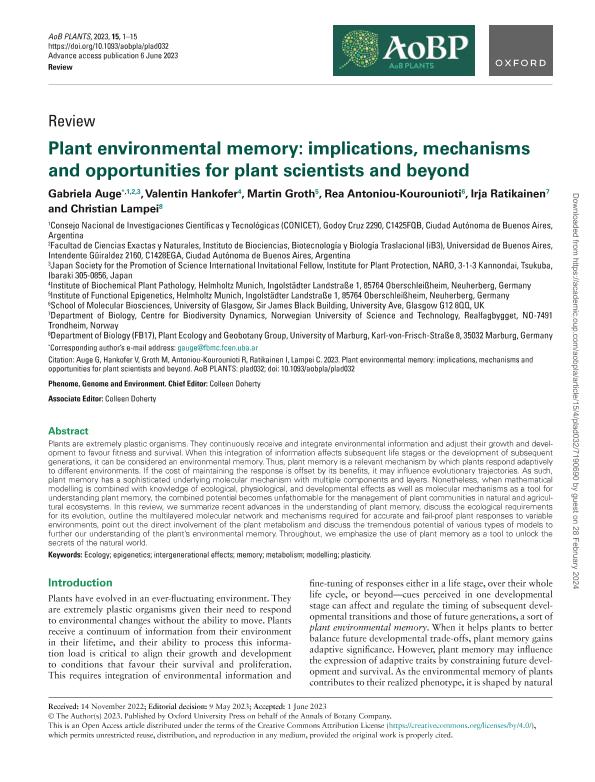Mostrar el registro sencillo del ítem
dc.contributor.author
Auge, Gabriela Alejandra

dc.contributor.author
Hankofer, Valentin
dc.contributor.author
Groth, Martin
dc.contributor.author
Antoniou-Kourounioti, Rea
dc.contributor.author
Ratikainen, Irja
dc.contributor.author
Lampei, Christian
dc.date.available
2024-02-28T12:57:59Z
dc.date.issued
2023-06
dc.identifier.citation
Auge, Gabriela Alejandra; Hankofer, Valentin; Groth, Martin; Antoniou-Kourounioti, Rea; Ratikainen, Irja; et al.; Plant environmental memory: implications, mechanisms and opportunities for plant scientists and beyond; Oxford University Press; AoB PLANTS; 15; 4; 6-2023; 1-15
dc.identifier.uri
http://hdl.handle.net/11336/228759
dc.description.abstract
Plants are extremely plastic organisms. They continuously receive and integrate environmental information and adjust their growth and development to favour fitness and survival. When this integration of information affects subsequent life stages or the development of subsequent generations, it can be considered an environmental memory. Thus, plant memory is a relevant mechanism by which plants respond adaptively to different environments. If the cost of maintaining the response is offset by its benefits, it may influence evolutionary trajectories. As such, plant memory has a sophisticated underlying molecular mechanism with multiple components and layers. Nonetheless, when mathematical modelling is combined with knowledge of ecological, physiological, and developmental effects as well as molecular mechanisms as a tool for understanding plant memory, the combined potential becomes unfathomable for the management of plant communities in natural and agricultural ecosystems. In this review, we summarize recent advances in the understanding of plant memory, discuss the ecological requirements for its evolution, outline the multilayered molecular network and mechanisms required for accurate and fail-proof plant responses to variable environments, point out the direct involvement of the plant metabolism and discuss the tremendous potential of various types of models to further our understanding of the plant's environmental memory. Throughout, we emphasize the use of plant memory as a tool to unlock the secrets of the natural world.
dc.format
application/pdf
dc.language.iso
eng
dc.publisher
Oxford University Press

dc.rights
info:eu-repo/semantics/openAccess
dc.rights.uri
https://creativecommons.org/licenses/by/2.5/ar/
dc.subject
ECOLOGY
dc.subject
EPIGENETICS
dc.subject
INTERGENERATIONAL EFFECTS
dc.subject
MEMORY
dc.subject
METABOLISM
dc.subject
MODELLING
dc.subject
PLASTICITY
dc.subject.classification
Ciencias de las Plantas, Botánica

dc.subject.classification
Ciencias Biológicas

dc.subject.classification
CIENCIAS NATURALES Y EXACTAS

dc.title
Plant environmental memory: implications, mechanisms and opportunities for plant scientists and beyond
dc.type
info:eu-repo/semantics/article
dc.type
info:ar-repo/semantics/artículo
dc.type
info:eu-repo/semantics/publishedVersion
dc.date.updated
2024-02-28T10:20:55Z
dc.identifier.eissn
2041-2851
dc.journal.volume
15
dc.journal.number
4
dc.journal.pagination
1-15
dc.journal.pais
Reino Unido

dc.journal.ciudad
Oxford
dc.description.fil
Fil: Auge, Gabriela Alejandra. Consejo Nacional de Investigaciones Científicas y Técnicas; Argentina. Universidad de Buenos Aires. Facultad de Ciencias Exactas y Naturales. Instituto de Biociencias, Biotecnología y Biología Traslacional.; Argentina. Japan Society For The Promotion Of Science. Institute for Plant Protection; Japón
dc.description.fil
Fil: Hankofer, Valentin. Institute of Biochemical Plant Pathology, Helmholtz Munich; Alemania
dc.description.fil
Fil: Groth, Martin. Institute of Functional Epigenetics; Alemania
dc.description.fil
Fil: Antoniou-Kourounioti, Rea. University of Glasgow; Reino Unido
dc.description.fil
Fil: Ratikainen, Irja. Norwegian University of Science and Technology; Noruega
dc.description.fil
Fil: Lampei, Christian. University of Marburg; Alemania
dc.journal.title
AoB PLANTS
dc.relation.alternativeid
info:eu-repo/semantics/altIdentifier/url/https://academic.oup.com/aobpla/advance-article/doi/10.1093/aobpla/plad032/7190690
dc.relation.alternativeid
info:eu-repo/semantics/altIdentifier/doi/http://dx.doi.org/10.1093/aobpla/plad032
Archivos asociados
